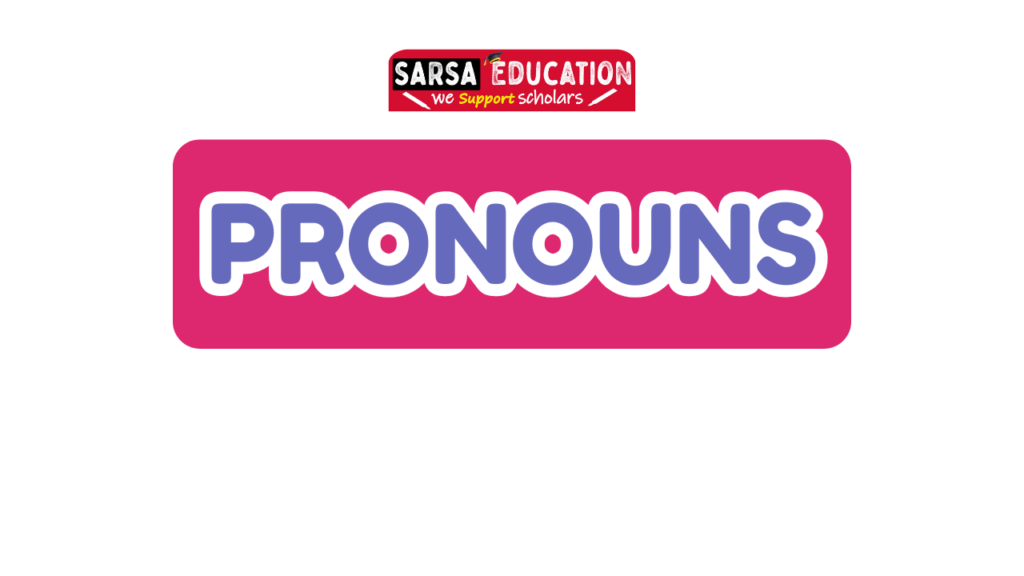Contents
Pronouns
It is a word that takes the place of one or more nouns.
- It must match the noun it refers to.
- It matches the noun or nouns they replace.
- Singular pronoun are I, you, he, she, it, me, him, and her.
- Plural pronoun are we, you, they, us, and them
- e.g – Reena plays ball. She plays ball.
- Use ‘I’ and ‘we’ to tell about yourself and others in the subject of a sentence.
- Use ‘me’ and ‘us’ after an action verb.
- e.g.- Lil and I play outside. Bob gives us the ball.
Types of pronouns
- Personal Pronouns
- Demonstrative Pronouns
- Possessive Pronouns
- Reflexive Pronouns
- Object Pronouns
Personal Pronoun
| Who is being discussed? | People involved | |
| 1st person | speaker | The speaker is referring to himself or a group |
| 2nd person | at least one listener | The speaker is talking directly to another person |
| 3rd person | person or thing the speaker is discussing | The speaker is talking to another person or group of people about a third person or thing—not the speaker, not the listener, but someone or something else. |
A subject pronoun indicates who or what acts as a sentence. I, you, he, she, it, they, and we are subject pronouns. This, that, these, and those can also sometimes serve as subject pronouns.
Read also: Pronoun Worksheets
| Singular | Plural |
| I | we |
| you | you |
| he | they |
| she | |
| it |
- Singular = one person or thing
- Plural thing = more than one person
Key points to remember
- The subject pronoun I is always a capital letter. (I not i).
- A person is he or she.
- A thing or a place is it.
- An animal is it. An animal with a name is he or she
Example:
- Joe bought a gift last week.
- He gave it to Maggie yesterday.
He = Joe it = gift
- Many people are in line, waiting to buy this book.
- They have been waiting to buy it all afternoon.
- They= Many people it= This book
Read also: Pronoun Worksheets
Demonstrative Pronoun
| Singular | this (near) | this shirt |
| that (far) | that shirt | |
| Plural | these (near) | these shirts |
| those (far) | those shirts |
1. This is my book.
(Refers to something close.)
2. That was a great movie.
(Refers to something farther away.)
3. These are my shoes.
(Refers to multiple things close by.)
4. Those belong to my sister.
(Refers to multiple things farther away.)
Possessive Pronoun
| Adjectives | Pronoun |
| my | mine |
| your | yours |
| his | his |
| her | hers |
| our | ours |
| your | Yours |
| their | theirs |
Examples:
- It’s my book. OR It’s mine.
- They’re her books. OR They’re hers.
- These are ours and those are yours.
- Is that Nick and Jenny’s dog? Yes, it’s theirs.
Reflexive Pronoun
Use a Reflexive Pronoun instead of an object pronoun if the subject of the sentence is doing the action to himself or herself.
Myself, yourself, himself, herself, itself, ourselves, themselves, and yourselves are reflexive pronouns.
| Subject | Object | Possessive | Reflexive |
| I | Me | My, mine | Myself |
| We | Us | Our, ours | Ourselves |
| You | You | Your, yours | Yourself, Yourselves |
| He | Him | His | Himself |
| She | Her | Her, Hers | Herself |
| They | Them | Their, theirs | themselves |
Read also: Pronoun Worksheets
When to use Reflexive Pronoun:
- To Show Emphasis
Example: You should do it yourself! (Adds emphasis, but “yourself” can be removed without changing the meaning.)
2. When the Subject and Object are the Same
Example: He introduced himself to the Manager.
3. With Certain Verbs (some verbs often take reflexive pronouns)
Enjoy yourself, hurt yourself, teach yourself, introduce yourself, prepare yourself.
Examples:
- The cat cleaned itself after eating. (“Itself” refers to “The cat.”)
- She prepared herself for the exam. (“Herself” refers to “She.”)
- I taught myself how to play the guitar. (“Myself” refers to “I.”)
Object Pronoun
An object pronoun indicates who or what receives the action. Me, you, him, her, it, us, and them are object pronouns. This, that, these, and those can also sometimes serve as object pronouns.
List of Object Pronouns
| Subject Pronoun | Object Pronoun |
| I | me |
| You | you |
| He | him |
| She | her |
| It | it |
| We | us |
| They | them |
Examples
- They invited us to their party. (“Us” is the object of the verb “invited.”)
- Can you help them with the homework? (“Them” is the object of the verb “help.”)
- The teacher gave her a certificate. (“Her” is the object of the verb “gave.”)
Read also: Day 1: Articles
Common Noun- Practice worksheet click here
Proper Noun- Practice worksheet click here
For regular English Speaking Course updates, kindly join our Telegram channel
Follow the Sarsa Education channel on Telegram: https://shorturl.at/R5WKa

